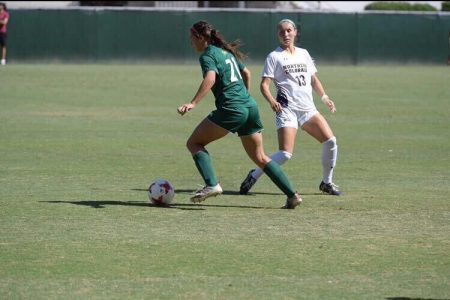Sac state soccer player overcomes rare blood disorder, torn ACL
Sac State soccer player Christina Lazar poses at Kaiser Hospital in Roseville. Lazar was diagnosed with a rare blood disease and had to heal from a torn ACL before she could return to playing for Sac State’s team in March. Photo courtesy of Christina Lazar.
May 19, 2020
On March 8, Sacramento State soccer player Christina Lazar played her first game in over a year following her battle with a rare blood disorder and a torn ACL.
Lazar grew up in Rocklin and has been playing soccer since she was in preschool. She was introduced to the sport because she wanted to copy her big sister.
“I started playing around probably 5 or 6,” Lazar said. “Whenever the intro rec league starts. Pretty much ever since I could walk.”
Lazar fell in love with the sport, and she was good. She played on her sister’s competitive team when she was 10, playing with girls who were two and three years older than her, said her mom, Robyn Lazar.
Christina Lazar realized at the start of her freshman year at Rocklin High School she was good enough to play college soccer, and went on to be named MVP of the Sierra Foothill League (SFL) as a junior, and was a two-time all-SFL first-team selection.
When it came time to choose where she would play college soccer, Christina Lazar said Sac State had not been in the picture.
“Sacramento wasn’t even on my list of top three originally,” she said. “I didn’t even visit it and I grew up in Rocklin only 30 minutes away.”
But when Lazar arrived on campus and met the coaches, she knew that Sac State was going to be her school for the next four years.
“So I ended up doing a camp there and reached out to the coach there,” Lazar said. “And he gave me a tour. And I end up falling in love with the campus.”
Lazar adapted to her surroundings quickly. She grew close to her roommate and teammate Kylee Kim-Bustillos.
”Christina is a great teammate and friend,” Kim-Bustillos said. “She is like the mom of the team and definitely makes sure everyone is heard, and their feelings are felt and understood. She’s a very happy-go-lucky girl.”
Lazar shone in her first year at Sac State. She started all 20 matches, led the team with 1,843 total minutes and was named co-defensive player of the year.
Story continues below photo.

“I was so lucky to walk in and get a position right away,” she said. ”Because I know it’s just a competitive field.”
Lazar’s life changed in her first year at Sac State when she found out she had idiopathic thrombocytopenia purpura.
“Over winter break I was in and out of the hospital like every week, just doing countless tests,” Lazar said.
ITP is a blood disorder where a person’s body attacks and destroys its own platelets. Platelets are responsible for the clotting factor in blood, so if a person doesn’t have an appropriate amount of platelets they are at risk of severe bleeding.
One day after practice, Lazar told Sac State trainer Matthew Greenwald that she had abdominal pain and he sent her to the school’s health center for an evaluation.
“During her visit there they checked her blood and noticed her platelet count was low,” Greenwald said. “They had her come back a few weeks later to check her blood again and her platelets were even lower that time.”
When the doctor called Lazar and told her she had ITP, she was at home with her parents in Rocklin.
“It was super scary,” Robyn Lazar said. “Just the seriousness of it is pretty hard. Especially not knowing. And she was playing all that time and we weren’t even aware. It was by the grace of God she had that extra blood test and that they told her something is not right.”
Christina Lazar’s parents were especially worried because they knew very little about ITP.
“When I started looking for information or support groups at the time there weren’t any in the U.S., let alone locally,” Robyn Lazar said. “So there wasn’t a lot of information for me to gather or find.”
In order for Christina Lazar to play soccer, she had to get treatments to make sure her platelet level was safe for her to do so.
“In order to monitor her condition, she had regular appointments with her hematologist, had her blood taken every week to check her platelet count and spoke with our team physician about her status,” Greenwald said. “Given her blood disorder she was at higher risk for bleeding so we needed to be very cautious about her sustaining any injuries, especially internal injuries.”
Going into her sophomore year, Lazar continued blood treatments, but not all of them were working. She missed nine games due to these treatments.
Lazar’s problems would only worsen. During a match against the University of Northern Colorado she tore her ACL, causing her to miss the rest of the season.
“A girl and I were sprinting to the ball toward our goal, and I tried to shield her off the ball to clear it, and she ran through my back and my knee was hyperextended and twisted,” Lazar said.
Due to Lazar’s blood condition, she had to reach a specific blood count before they could perform the surgery on her ACL.
Lazar missed her whole junior season due to her ACL injury and her blood condition.
“She always had a really good attitude and was always involved with the team despite not being able to play for over a year,” Kim-Bustillos said.
With Lazar’s blood treatments not fully working, the doctors decided to try another way. She went through a month of blood infusion treatments. She compared it to a chemotherapy treatment that they give to cancer patients.
Lazar’s parents were there every step of the way during these six hours of treatments.
“It’s kinda hard to understand the whole realm of it,” Robyn Lazar said. “But then when you go and you have to meet with the specialist and the blood doctors, you are in there with cancer patients. It was very surreal and you don’t know what to do to help her.”
These treatments were more successful than any other treatments for Christina Lazar and on March 8, she was able to play her first match in over a year against California State University, Stanislaus.
Lazar started in that game, and scored a goal on a corner kick. Although she scored, it wasn’t that moment that the Sac State women’s soccer coach Randy Dedini reveled in. He said he felt pure joy and happiness when he saw her take the pitch for the first time in over a year.
“I was really happy for her,” Dedini said. “Seeing the hard times she went through not only with her blood condition but with her ACL and everything, my emotions were just joy and (I was) really happy for her, running out with a smile on her face.”

































































































































Mary Marquardt • May 20, 2020 at 12:18 pm
Love this article hilighting the strength and tenacity of this very special and talented young woman! Christina has always had a special light and we were so proud of how she made it through this journey. Thank God she was able to make it back on the field and continue to share her talents for Sac State, and also help share information about her disorder to help others, since it’s so rare! Love you Christina!